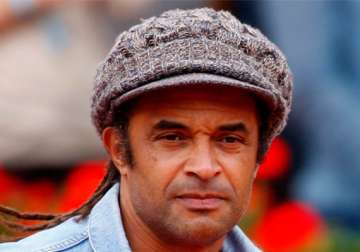Noah : Accusations On Doping Were A Wake-Up Call
Paris, Nov 25: Yannick Noah says his accusations of doping being rife in Spanish sport were intended as a global wake-up call to sports authorities he feels should be doing more to catch drug cheats—but

Paris, Nov 25: Yannick Noah says his accusations of doping being rife in Spanish sport were intended as a global wake-up call to sports authorities he feels should be doing more to catch drug cheats—but he maintains that Spain is tainted.
In an interview with a French newspaper last week, the former French Open tennis champion accused Spanish athletes of widespread doping.
He said that the only way to level the playing field for struggling French and other athletes would be to allow everyone to use the “magic potion,” or banned drugs.
“If I chose this turn of phrase, it was to address the authorities ... in order to start a debate,” Noah said Friday on the website of newspaper Le Monde that published his comments last week.
Those accusations drew criticism from Spanish athletes such as 10-time Grand Slam champion Rafael Nadal, and from the French Tennis Federation, which distanced itself from Noah.
“I am a bit frustrated that there are two weights and two measures in terms of doping, whether it's Spain or another country,” Noah continued. “Of course all Spanish athletes aren't doped ... (But) are (the French) worse than the others? I don't think so.”
Nadal said Noah should be banned from commenting in the media, while Barcelona's football coach Pep Guardiola told him to produce proof or stay quiet.
“I went through the same thing 30 years ago, when I was 20. I spoke about doping and drugs and everyone had a go at me,” Noah said. “I couldn't respond to everyone. To Toni Nadal, Rafael's uncle, who's told his nephew never to say hello to me again. But what do I care if he says hello to me or not?”
Noah refused to back down from his view that Spain remains tainted by doping.
He cited cases involving cyclist Alberto Contador's positive doping test when he won the 2010 Tour de France, world steeplechase champion Marta Dominguez, and the Operation Puerto blood-doping investigation as examples.
“The cyclist who ate some meat that helped him pedal faster and who was cleared by his federation, the case of (Dominguez) stopped by the police and then cleared,” Noah said. “My question is the following: Is this not all orchestrated? In the Puerto case, I have the feeling that the affair has been smothered, that names have been hidden.”
Dominguez was among 14 people detained in December 2010 as part of the “Operation Galgo” doping investigation, but a Madrid court cleared her of doping and of trafficking performance-enhancing substances.
This led to an investigation into Spain's Civil Guard for irregularities in managing her case.
Seven people linked to Puerto will stand trial in Spain, facing up to two years in prison. They include sports doctor Eufemiano Fuentes, former Liberty Seguros team boss Manolo Saiz and five others arrested in 2006 on suspicion of providing doping services to cyclists.
Puerto implicated more than 50 cyclists but Spanish sports bodies could not use evidence to ban athletes because of Spanish law, which has since changed.
On Thurday, sport's highest court completed a four-day hearing into Contador's 2010 Tour case. Hu must wait until early next year to find out if he will be stripped of his title.
Contador's defense is that eating contaminated steak caused his positive tests for clenbuterol.
“I am against all forms of doping but I'm hypersensitive when it comes to injustice. There are too many cheats winning these days. In Spain and elsewhere,” Noah said. “At which point is an athlete considered to have doped? When he takes a product that makes him run faster, makes him stronger, helps him recover more quickly? Or when he tests positive? The answer to the question is not the same, depending on the country.”
Noah blamed the media for not being aggressive enough on doping issues.
“There are side effects which you never read about on the front pages of the newspapers,” he said. “We know there have been problems in the past with Italian footballers who are now seriously ill.”